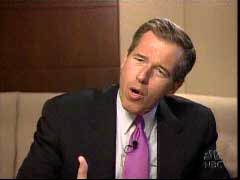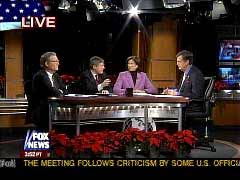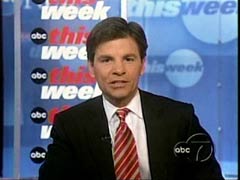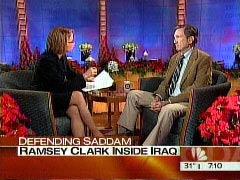 |
||||||||||||||
|
||||||||||||||
 |
||
|
 |
||||||||||||||||||||||||
|
||||||||||||||||||||||||
 |
||||||
|
||||||
 |
|||||||||
|
 |
||||||||||||||||||
|
||||||||||||||||||
 |
|||||||||||||||||||||
|
|||||||||||||||||||||
 |
||||||||||||||||||
|
||||||||||||||||||
|
|
||
|

|
||
 |
The 2,106th CyberAlert. Tracking Liberal Media Bias Since 1996
11:10am EST, Tuesday December 13, 2005 (Vol. Ten; No. 219)
|
2. FNC's Panel Ridicules Newsweek's "Bush in the Bubble" Cover Story
3. ABC Promotes Stephanopoulos to Chief Washington Correspondent
4. Katie Couric Not So Tough With Hussein Lawyer Ramsey Clark
As recounted in the September 9 CyberAlert, he approvingly relayed how, a "refrain" he heard from "everyone watching the coverage all week," was "had this been Nantucket, had this been Boston, Cleveland, Chicago, Miami, Los Angeles, how many choppers would have-" At that point, audience applause caused him to cut off his sentence as he gestured toward the audience to cite affirmation of his point. Hard to imagine that if Williams heard the refrain, which is out there, that the hurricane's destruction of abortion clinics in New Orleans shows it was meant as God's punishment of sinful behavior in the city, Williams would have so willingly passed along that line of reasoning.
For the September 9 CyberAlert item: www.mediaresearch.org [This item was posted Monday night on the MRC's blog, NewsBusters.org. To post your comments, go to: newsbusters.org ] As Bush and Williams sat in Bush's office on Air Force One, Williams asked:
"After the tragedy, I heard someone ask rhetorically, 'What if this had been Nantucket, Massachusetts, or Inner Harbor Baltimore or Chicago or Houston?' Are you convinced the response would have been the same? Was there any social or class or race aspect to the response?" MSNBC.com has posted a transcript of the entire interviews conducted at three locations during the day Monday: www.msnbc.msn.com Note: Only excerpts ran on the December 12 NBC Nightly News, so most of what is in the transcript did not air on the NBC Nightly News. The Nightly News Web site features video of the entirety of all three interview sessions, but you must use MS Internet Explorer and have Windows Media 10 as well as Macromedia Flash 7 installed: www.msnbc.msn.com Tuesday night at 10pm EST, MSNBC will air an hour-long special, A Day with the President, based on Williams' interviews. 
The roundtable members Monday night on FNC's Special Report with Brit Hume derided the premise of this week's Newsweek cover story with President Bush on the cover inside a bubble. Inside the magazine, under the "Bush in the Bubble" headline, Evan Thomas and Richard Wolffe insisted: "Bush may be the most isolated President in modern history, at least since the late-stage Richard Nixon." On FNC, Morton Kondracke contended "that this piece comes directly from the Washington establishment. 'Bush is in a bubble that does not include us. We should be inside the bubble, all buzzing in Bush's ear.'" Kondracke contended that Bush talks to the people that he wants to talk to. But the people who he doesn't talk to is, you know, this Washington old guard that buzzes back to the press all the time." Mara Liasson of NPR rejected the premise of the article that Bush would act differently if only he talked to more people and suggested Newsweek was frustrated by a White House staff who "aren't inviting them in for long lunches where they bare their souls." Fred Barnes characterized the magazine's take as a "hearty perennial...for journalism" and recalled how Newsweek had dismissed President Reagan's White House as "The Detached Presidency." In fact, the September 7, 1981 Newsweek article was headlined: "A Disengaged Presidency." But the first sentence of the story acknowledged the media's lack of respect for Reagan and included the "detached" term: "For weeks the White House press corps has wondered and wisecracked about Ronald Reagan's detached style of leadership: his apparent unfamiliarity with some issues before him, his reliance on aides and campaign-style cue cards in dealing with Congressional power brokers and foreign leaders." The piece, which carried Eleanor Clift's byline, later charged: "Reagan's undemanding approach to his work can lead to embarrassing displays of inattention and ignorance." [This item was posted Monday afternoon on the MRC's blog, NewsBusters.org. To share your views, go to: newsbusters.org ] The cover of the December 19 Newsweek shows President Bush inside a bubble with this question below, "Bush's World: The Isolated President: Can He Change?" In addition to up top bylines from Thomas and Wolffe, the end of the story lists "assistance" from Holly Bailey, Daniel Klaidman, Eleanor Clift, Michael Hirsh and John Barry. For the article, go to: www.msnbc.msn.com The very last paragraph of the article praised President Bush's father for doing the "right thing" in breaking his "no new taxes" promise and described that as "essential" to creating the boom of the 1990s: "True mandates for hard choices come from reaching out and compromising. Bush's father understood that. Breaking his own 'read my lips' promise at the 1988 Republican convention, he raised taxes in 1991 as part of a fiscal-reform package that was essential to the 1990s economic boom. The tax hike probably cost the senior Bush a second term in 1992. But it was the right thing to do. It's very unlikely the son would do the same." To conservatives, that's a good thing. But not to the media elite. For excerpts from the Newsweek article (plus a shot of the cover) and a list of the unattributed claims, check this Sunday NewsBusters posting from Noel Sheppard: newsbusters.org A transcript of the discussion during the second segment of the panel segment on the December 12 Special Report with Brit Hume:
Hume: "There's an article this week [in Newsweek] saying that the President is perhaps 'the most isolated in modern American history.'"
A Disengaged Presidency By Peter McGrath with Thomas M. DeFrank in Santa Barbara and Eleanor Clift in Washington For weeks the White House press corps has wondered and wisecracked about Ronald Reagan's detached style of leadership: his apparent unfamiliarity with some issues before him, his reliance on aides and campaign-style cue cards in dealing with Congressional power brokers and foreign leaders. So reporters were well primed a fortnight ago when White House counselor Edwin R. Meese blundered by failing to notify the President immediately after two U.S. jets, fired on by Libyan fighters, blasted their attackers out of the sky. Suddenly the private doubts went public in a rush of cynical stories and slightly spiteful cartoons: was Reagan so disengaged from the daily routine of government as to be--in the words of one correspondent -- "little more than a figurehead President"? At first blush the question seems more than a little odd. The first half-year of Reagan's tenure was marked by decisive victories over Congress -- two on the budget, one on his tax cut--and in each case Reagan himself fought in the trenches, staying on the phone "until there wasn't anybody left to call," says deputy chief of staff Michael K. Deaver. "Hell," says Deaver, "we've just come through the greatest six months of accomplishment since Franklin D. Roosevelt. If that's disengagement, what could we accomplish if he ever decided to really get into it?" Moreover, on his return to Washington this week, the President faces a number of hard personal decisions -- on the MX-missile system, arms control and changes in Social Security. "We're on an escalating line in terms of his personal involvement," says Cabinet secretary Craig Fuller, "and people suddenly begin to ask how plugged in he is. It's crazy." Reagan is no workaholic, however, as even his most ardent admirers privately admit. Even in Washington, he's never in the office before 8:45 a.m., and it's a rare day that doesn't see him out by 6. He takes Wednesday afternoons off for horseback riding at a Marine base in the Virginia suburbs -- "Nothing's as good for the inside of a man as the outside of a horse," he says -- and at night he alternates TV viewing with what an aide calls "a reading program" -- in essence, an even briefer version of the usual Presidential briefing papers. One White House assistant who thinks that Reagan should be more immersed in daily affairs claims that "he probably spends two or three hours at most on real work." Once, for a magazine story, aides reshuffled Reagan's appointments to produce a whirlwind, ten-hour tour de force. "That wasn't a day in the life," another senior staffer joked later, "that was a week in the life." 'Wing It': Reagan's undemanding approach to his work can lead to embarrassing displays of inattention and ignorance. He was unable to answer a press conference question about a pending fishing treaty with Canada on the very day the White House was telling the Senate that the treaty would be withdrawn for renegotiation. At a meeting with mayors, he greeted his own Secretary of Housing and Urban Development Samuel R. Pierce Jr. as "Mr. Mayor." And he drew a blank when a congressman he was lobbying on the budget raised the subject of synthetic-fuel programs. "He didn't know what I was talking about," said Democratic Rep. Charles Wilson of Texas. "He's a quick study, but he's got to study," a White House aide complained after another Reagan gaffe. "Sometimes he'd rather wing it." Reagan appears unruffled by such snafus, however. Briefly forsaking the total isolation of his ranch last week for a GOP fund-raiser, he rendered a personal verdict on his Presidency: "After all the horror stories about the job, I'm kind of enjoying myself." Yet he is easily bored, some aides admit, alternately joking and yawning through subjects that don't interest him. "There are times when you really need him to do some work, and all he wants to do is tell stories about his movie days," says one top assistant. Another puts it more charitably: "It's never been a question of his work capacity or his stamina. It's always been a question of his interest level." In the President's absence, his staff takes up the slack. As Eisenhower did before him, Reagan has decentralized authority, locating a good deal of it in his "troika" of top aides--policy "synthesizer" Meese, personal aide Deaver, and chief of staff James A. Baker, the master of politics and organization. As Deaver explains, "There isn't a major decision made without [Reagan's] active participation, but he doesn't feel the need to get involved in everything. He just assumes a lot of stuff will get taken care of without him getting into it." The Troika: But this approach, too, has its perils. Things do get done when all three members of the troika are on tap, but the absence of one or two can seriously overload the third. And even at best, the arrangement makes Reagan vulnerable to criticism that he is a creature of his staff. That line emerged after Meese decided not to worry him about the Libyan dogfight--or later when he overprotectively fended off reporters trying to question Reagan about his delayed decision on the controversial MX missile. "Mr. President, you're not obliged to answer any questions," prompted Meese, much to the annoyance of other top aides. "That's the second time this week he's made the President look foolish," said one. "He's out of control. He likes being President Meese too much." Meese shocked some colleagues, for example, by taking a front-row seat near Reagan during their visit to the aircraft carrier Constellation. Though still "first among equals" to Reagan, he is faulted for poor organization and a weak staff. To the degree that Reagan's remote control leaves him ignorant of important issues, it also limits his ability to be a credible world leader. At the recent Ottawa summit meeting of free-world heads of state, for example, White House officials had to negotiate for fewer sessions in which Reagan would meet his counterparts alone, without staff, because they feared he would be overmatched. "There are some uncomfortable moments, especially with guys like [Canadian Prime Minister Pierre] Trudeau, who have complete mastery of their dossiers and can talk about these things off the top of their heads," says one high-ranking aide. "The President's not there yet, and my guess is that he won't [ever] be."... END of Excerpt from the 1981 Newsweek 
The unbylined Monday AP dispatch added: "The new job title will put Stephanopoulos, an adviser to President Clinton before joining ABC News, in line with his Sunday-morning competitors: Bob Schieffer is chief Washington correspondent for CBS News, and Tim Russert is Washington bureau chief at NBC News."
For the AP story, as posted by Yahoo: news.yahoo.com 
-- Brent Baker 
Home | News Division
| Bozell Columns | CyberAlerts |







 NBC anchor Brian Williams raised a wide variety of issues with President Bush in interviews conducted through the day Monday, starting in the morning in the Oval Office and ending with a session following the President's speech in Philadelphia. But in an interview conducted on Air Force One on the way to Philadelphia, and shown on Monday's NBC Nightly News, Williams raised, in the guise of what he overheard someone wonder, the racist angle in the response to Hurricane Katrina in New Orleans. Williams proposed: "After the tragedy, I heard someone ask rhetorically, 'What if this had been Nantucket, Massachusetts, or Inner Harbor Baltimore or Chicago or Houston?' Are you convinced the response would have been the same? Was there any social or class or race aspect to the response?" Bush rejected the notion. Back in September on Comedy Central's Daily Show, Williams seemed to come dangerously close to endorsing the view that racism was behind the slow rescue of residents in New Orleans.
NBC anchor Brian Williams raised a wide variety of issues with President Bush in interviews conducted through the day Monday, starting in the morning in the Oval Office and ending with a session following the President's speech in Philadelphia. But in an interview conducted on Air Force One on the way to Philadelphia, and shown on Monday's NBC Nightly News, Williams raised, in the guise of what he overheard someone wonder, the racist angle in the response to Hurricane Katrina in New Orleans. Williams proposed: "After the tragedy, I heard someone ask rhetorically, 'What if this had been Nantucket, Massachusetts, or Inner Harbor Baltimore or Chicago or Houston?' Are you convinced the response would have been the same? Was there any social or class or race aspect to the response?" Bush rejected the notion. Back in September on Comedy Central's Daily Show, Williams seemed to come dangerously close to endorsing the view that racism was behind the slow rescue of residents in New Orleans. 


 ABC News has promoted former Clintonista George Stephanopoulos, host of This Week, to be the network's chief Washington correspondent. Relaying the content of an ABC press release, the AP reported that Stephanopoulos will "report for network programs World News Tonight, Nightline and Good Morning America" and "will also oversee the network's coverage of Congress with the impending departure of reporter Linda Douglass."
ABC News has promoted former Clintonista George Stephanopoulos, host of This Week, to be the network's chief Washington correspondent. Relaying the content of an ABC press release, the AP reported that Stephanopoulos will "report for network programs World News Tonight, Nightline and Good Morning America" and "will also oversee the network's coverage of Congress with the impending departure of reporter Linda Douglass." 
 In two NewsBusters postings on
Monday, the MRC's Tim Graham examined Katie Couric's "exclusive" interview with
the radical leftist Ramsey Clark, the Johnson administration Attorney General
who is part of Saddam Hussein's defense team. "Katie's Interview on Planet
Ramsey Clark: The Wimpy Part," is much longer than "Katie's Interview on Planet
Ramsey Clark: The Tougher Part."
In two NewsBusters postings on
Monday, the MRC's Tim Graham examined Katie Couric's "exclusive" interview with
the radical leftist Ramsey Clark, the Johnson administration Attorney General
who is part of Saddam Hussein's defense team. "Katie's Interview on Planet
Ramsey Clark: The Wimpy Part," is much longer than "Katie's Interview on Planet
Ramsey Clark: The Tougher Part."